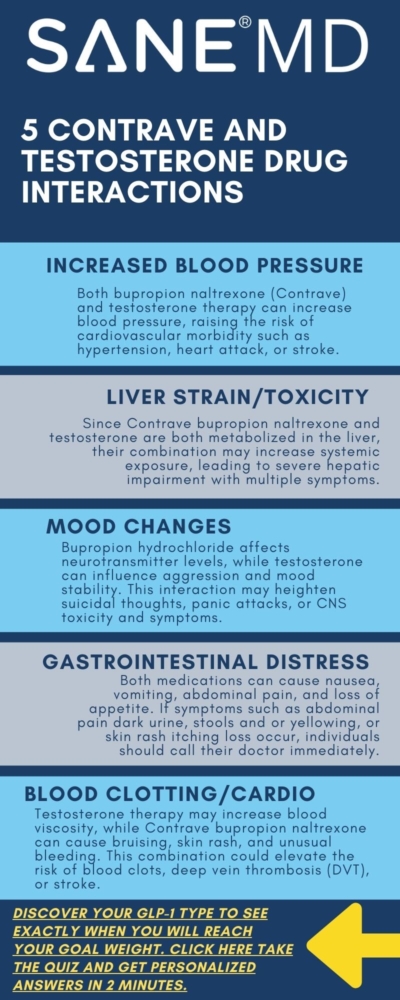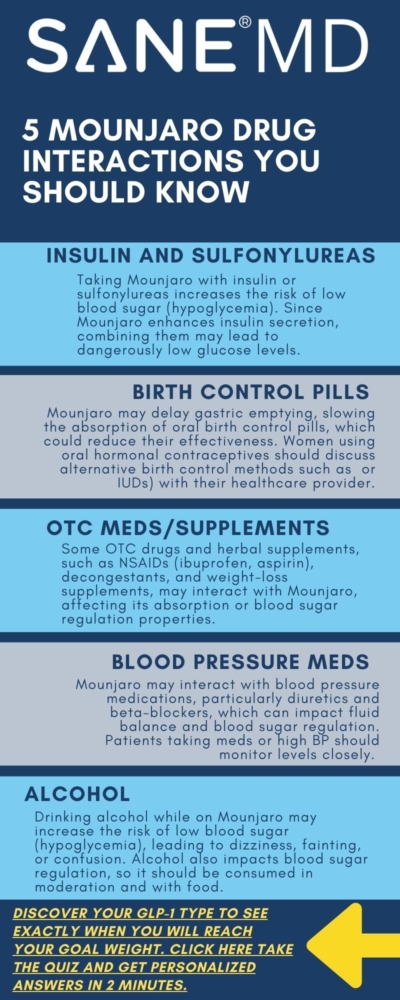Contrave and Testosterone Drug Interactions: A Risky Combo?

Contrave drug interactions are common, even with testosterone. The combination of Contrave and testosterone raises concerns due to the potential for increased cardiovascular strain, liver complications, and mood fluctuations. Contrave (bupropion naltrexone) is used for chronic weight management for a subset of individuals, while testosterone therapy treats low testosterone levels in men. However, Contrave and testosterone drug interactions could pose significant risks for those taking both.
While deciding if Contrave is right for you, you must explore any potential drug interactions to ensure safety.
This article explores the effects of the medication, the potential increased risk of side effects, and why talking to your doctor before combining these treatments is essential.
Key Takeaways
- Combining Contrave and testosterone may lead to increased blood pressure, liver issues, and mood changes due to their overlapping effects.
- Individuals taking Contrave (bupropion + naltrexone) should talk to their doctor before using other medications, including vitamins and herbs, to avoid serious drug interactions.
- Watch for warning signs such as nausea, vomiting, abdominal pain, dark urine, pale stools, skin rash, itching, or joint pain, and call your doctor immediately if these symptoms occur.
Understanding Contrave and Testosterone
Contrave is a prescription weight loss medication that contains bupropion and naltrexone. Bupropion hydrochloride is commonly used to treat depression, while naltrexone hydrochloride is a pure opioid antagonist used for addiction treatment. Together, they promote clinically meaningful weight loss for compatible individuals when paired with a reduced-calorie diet.
Testosterone therapy is often prescribed for low testosterone levels, which may improve energy, muscle mass, and overall well-being. However, it can also lead to increased blood pressure, mood swings, and cardiovascular concerns.
Contrave and Testosterone Drug Interactions Summary
| Category | Contrave (Bupropion/Naltrexone) | Testosterone Therapy |
|---|---|---|
| Medication Purpose | Weight loss aid; combines antidepressant (bupropion) and opioid antagonist (naltrexone) | Treats low testosterone, enhances energy, muscle mass, and libido |
| Potential Risks | Increased blood pressure, liver strain, mood changes, nausea, vomiting | Mood swings, cardiovascular risks, liver strain, increased blood pressure |
| Precautions | Avoid alcohol, disclose all medications, monitor side effects | Monitor cardiovascular health, avoid certain medications, follow doctor’s instructions |
| Serious Side Effects | Dark urine, pale stools, nausea, vomiting, abdominal pain | Joint pain, swelling, unusual bleeding, mood disturbances |
| Drug & Food Interactions | High-fat meals increase systemic exposure; alcohol raises risk of seizures and liver problems | High-calorie or high-fat diets may exacerbate cardiovascular risks; alcohol increases liver strain |
| When to Call Your Doctor | Severe abdominal pain, yellowing of the skin, unusual bruising or bleeding | Chest pain, severe mood changes, excessive swelling or bruising |
Potential Drug Interactions
When combining Contrave and testosterone, the increased risk of several complications arises, including:
1. Increased Blood Pressure and Cardiovascular Risks
Both bupropion naltrexone (Contrave) and testosterone can increase blood pressure, leading to cardiovascular morbidity. Individuals with heart disease should be cautious and tell their doctor before using these medications together.
Therapeutic duplication warnings indicate that the combined use may increase the risk of hypertension, heart attack, or stroke.
2. Liver Problems and Systemic Exposure
Contrave (bupropion naltrexone) is metabolized in the liver, as is testosterone. Taking both may lead to systemic exposure and an increased risk of severe hepatic impairment. Individuals should watch for symptoms of liver damage, including dark urine, pale stools, yellowing of the skin, loss of appetite, and fatigue.
3. Mood Changes and Suicidal Thoughts
Bupropion naltrexone (Contrave) can affect the central nervous system, sometimes leading to suicidal thoughts, panic attacks, and CNS toxicity. Testosterone therapy may also influence mood and aggression. When combined, they may heighten these effects, making monitoring essential.
4. Gastrointestinal Distress and Adverse Reactions
Both drugs may cause nausea, vomiting, abdominal pain, loss of appetite, and fatigue. Patients should be aware of signs such as abdominal pain, dark urine, stools and or yellowing, skin rash, and itching loss, as these may indicate severe adverse reactions.
Precautions and Dose Adjustment
To reduce the increased risk of complications when taking Contrave (bupropion naltrexone) and testosterone therapy together, doctors may recommend a dose adjustment or alternative treatments. Since both medications impact blood pressure, liver function, and mood, careful monitoring is essential.

Some precautions to follow include:
- Avoid alcohol while being treated with Contrave and testosterone, as it can worsen liver strain and increase the risk of liver problems such as dark urine, pale stools, and yellowing of the skin. Alcohol can also amplify the likelihood of seizures, cardiovascular issues, and mood disturbances when combined with bupropion hydrochloride and testosterone.
- Do not stop taking medications without first talking to your doctor or pharmacist. Abruptly discontinuing bupropion naltrexone (Contrave) can cause withdrawal symptoms, while stopping testosterone therapy without medical guidance may lead to hormonal imbalances, fatigue, and mood instability.
- Disclose all oral medications, including vitamins and herbs, to your healthcare provider before starting or adjusting your treatment. Many other medications—including blood pressure medications, antidepressants, blood thinners, and corticosteroids—can interact with Contrave and testosterone, leading to adverse reactions or requiring therapeutic duplication warnings.
- Monitor for serious side effects and seek immediate medical attention if you experience pain, dark urine, pale stools, bruising skin rash, itching, fever, chills, joint pain, swelling, or unusual bleeding. These symptoms may indicate severe hepatic impairment, cardiovascular issues, or systemic toxicity, requiring urgent medical intervention.
- Be cautious with drug and food interactions, as consuming high-fat meals, caffeine, or excessive processed foods can alter the absorption of Contrave (bupropion naltrexone) and testosterone. Tell your doctor if you experience appetite fatigue, nausea, vomiting, joint pain or swelling, or unusual bleeding or bruising while on treatment.
Following these precautions and maintaining open communication with your doctor or pharmacist can help mitigate risks and ensure a safer treatment regimen when using Contrave (bupropion naltrexone)and testosterone therapy together.
Drug and Food Interactions
Certain foods may influence how these medications are processed in the body. For example, high-fat meals can increase systemic exposure to bupropion naltrexone (Contrave), leading to a greater risk of adverse reactions such as nausea, vomiting, abdominal pain, dark urine, and pale stools. Additionally, consuming alcohol while being treated with Contrave may heighten the likelihood of seizures, liver problems, or cardiovascular issues, particularly for those with high blood pressure.
For individuals on testosterone therapy, a high-calorie or high-fat diet may further elevate blood pressure and increase cardiovascular morbidity, especially when combined with Contrave. Since both medications impact liver function, avoiding excessive alcohol, processed foods, and excessive caffeine is recommended.
To minimize risks, patients should talk to their doctor or healthcare provider about dietary guidelines and not stop taking medications without first talking to a medical professional.
When to Call Your Doctor Immediately
Certain side effects of Contrave (bupropion naltrexone) and testosterone therapy may indicate serious health complications, such as liver problems, cardiovascular strain, or severe allergic reactions. If left untreated, these conditions can worsen, leading to systemic exposure to toxins, organ damage, or life-threatening events.
Call your doctor immediately if you experience any of the following Contrave side effects and symptoms:
- Nausea, vomiting, abdominal pain, dark urine – These symptoms may signal liver damage or toxicity, which can occur when both medications place excess strain on liver function. Persistent abdominal pain in dark urine should never be ignored, as it may indicate severe hepatic impairment.
- Fatigue, nausea, vomiting, abdominal pain – If you feel persistently tired or weak along with nausea, vomiting, and abdominal pain, it may be a sign of liver dysfunction or metabolic imbalances caused by the combined effects of bupropion naltrexone (Contrave) and testosterone therapy.
- Itching, loss of appetite, pale stools – These symptoms can indicate obstructed bile flow or liver dysfunction, particularly if paired with yellowing of the skin. If you notice pale stools, consult your doctor or pharmacist as soon as possible.
- Joint pain or swelling, unusual bleeding – Unexplained joint pain or swelling could be an inflammatory response triggered by an adverse reaction to one or both medications. Unusual bleeding or bruising might suggest blood clotting abnormalities or cardiovascular morbidity, both of which require urgent medical evaluation.
- Bleeding or bruising, skin rash, fever, chills, joint pain – If you experience bruising, skin rash, itching, coupled with fever, chills, or joint pain, this could be a sign of an allergic reaction, immune system disorder, or severe drug interaction. In some cases, these symptoms can indicate autoimmune responses or blood disorders that require immediate intervention.
If you experience any combination of these symptoms, call your doctor immediately to prevent further complications. Additionally, never stop medications you use, including vitamins and herbs, without consulting a healthcare provider, as doing so may worsen underlying health issues.
Frequently Asked Questions (FAQ)
When considering Contrave and testosterone drug interactions, it’s essential to understand the potential risks and precautions.
Below are answers to some commonly asked questions regarding the combination of these medications.
1. Can you take testosterone with BuPROPion?
Testosterone and bupropion naltrexone (Contrave) can be taken together, but they may increase the risk of high blood pressure, mood changes, and cardiovascular strain. Since bupropion hydrochloride affects neurotransmitter levels, combining it with testosterone—known to impact mood and aggression—could heighten anxiety, agitation, or even panic attacks.
Additionally, both drugs are metabolized in the liver, increasing the chance of liver problems. Always talk to your doctor before combining these medications.
2. What medications should not be taken with Contrave?
Several medications may interact with Contrave (bupropion naltrexone), leading to severe side effects. Monoamine oxidase inhibitors (MAOIs) should be avoided due to the risk of CNS toxicity and cardiovascular morbidity. Additionally, drugs that lower the seizure threshold, such as antipsychotics, corticosteroids, or certain antibiotics, can increase seizure risk. Contrave drug interactions can also occur with marijuana, so you’ll want to be careful combining them.
Other concerns include opioid withdrawal if taking opioid-based medications and possible interactions with oral medications, including vitamins and herbs. Always review your treatment regimen with a doctor or pharmacist before starting Contrave.
3. What medications Cannot be taken with testosterone?
Testosterone therapy may interact negatively with several other medications, particularly those affecting blood pressure, liver function, and hormone levels. Anticoagulants, corticosteroids, insulin, and certain heart medications may cause an increased risk of fluid retention, blood clots, or cardiovascular morbidity. Additionally, testosterone can interact with bupropion naltrexone (Contrave), potentially causing high blood pressure, skin rash, joint pain, and mood disturbances.
Always tell your doctor about all medications you use, including vitamins and herbs, before starting testosterone therapy.
4. Does Contrave affect hormones?
While Contrave (bupropion naltrexone) is not primarily a hormonal medication, it does influence dopamine and norepinephrine levels, which can indirectly impact mood and metabolism. In some cases, this may contribute to suicidal thoughts, anxiety, or hormonal imbalances.
Additionally, bupropion hydrochloride can interact with sex hormones, potentially affecting testosterone levels in men and estrogen levels in women. If you experience symptoms of liver damage, appetite fatigue, nausea, vomiting, or skin rash, consult your healthcare provider immediately.
5. Does testosterone interact with bupropion?
Testosterone and bupropion naltrexone (Contrave) may interact in ways that impact mood, blood pressure, and liver function. Since both drugs affect neurotransmitters and cardiovascular health, there is a potentially increased risk of suicidal thoughts, chest pain, joint pain, swelling, and unusual bleeding.
Furthermore, testosterone can influence systemic exposure to bupropion, altering its effectiveness or increasing side effects. If you are treated with these medications, ensure you talk to your doctor for proper monitoring and possible dose adjustments.
Conclusion
The interactions between your drugs can lead to serious health concerns. Since Contrave (bupropion naltrexone) and testosterone both influence blood pressure, liver problems, and mood changes, individuals should talk to their doctor before combining them. Monitoring for symptoms such as dark urine, pale stools, nausea, vomiting, and abdominal pain can help prevent severe complications.
If you are being treated with these medications, work with your doctor or pharmacist to ensure safe usage. The increased risk associated with this combination makes regular health monitoring essential.

Mounjaro for Insulin Resistance: Does it Really Work?

Mounjaro (tirzepatide) is gaining attention as a promising treatment for insulin resistance, a condition that affects millions worldwide and is a major precursor to type 2 diabetes. What is Mounjaro? Originally developed as a GLP-1 receptor agonist, Mounjaro also targets glucose-dependent insulinotropic polypeptide (GIP) receptors, making it a dual-action therapy for blood sugar control and weight management. But is Mounjaro for insulin resistance really effective?
This article explores how Mounjaro for insulin resistance may help regulate blood glucose, increase insulin sensitivity, and support weight loss for compatible individuals, while also examining its effectiveness, risks, and potential side effects.
Key Takeaways
- Mounjaro for insulin resistance helps regulate blood sugar by enhancing insulin secretion and reducing glucagon secretion, leading to better glucose control.
- Clinical trials suggest Mounjaro can aid in weight management, which is critical for improving insulin sensitivity in individuals with obesity and type 2 diabetes.
- While FDA-approved for type 2 diabetes, Mounjaro is being studied for its effectiveness in managing insulin resistance before diabetes develops.
What Is Insulin Resistance?
Insulin resistance occurs when the body’s cells do not respond well to insulin, the hormone that regulates blood glucose levels.
As a result, the pancreas compensates by producing more insulin, leading to elevated insulin levels and an increased risk of type 2 diabetes.
Causes of Insulin Resistance
Several factors contribute to the development of insulin resistance, including:
- Excess body weight and obesity, particularly around the abdomen
- High blood sugar levels over time
- Poor diet high in processed foods and added sugar
- Physical inactivity leading to decreased insulin sensitivity
- Genetics and a family history of diabetes
- High blood pressure and abnormal blood lipid levels
If left unaddressed, insulin resistance can gradually lead to pre-diabetes and eventually progress to type 2 diabetes.
Mounjaro for Insulin Resistance: Key Information Chart
| Category | Details |
|---|---|
| How Mounjaro Helps | Enhances insulin secretion, reduces glucagon, improves insulin sensitivity, slows gastric emptying, and supports weight loss. |
| Health Conditions Linked to Insulin Resistance | Type 2 diabetes, obesity, cardiovascular disease, non-alcoholic fatty liver disease (NAFLD), polycystic ovary syndrome (PCOS). |
| Key Mechanisms of Mounjaro | GLP-1 and GIP receptor activation, increased insulin secretion, lower blood glucose levels, delayed gastric emptying, better weight management. |
| Potential Risks & Side Effects | Common side effects include nausea, vomiting, diarrhea, fatigue, and headaches. More serious risks include pancreatitis, severe hypoglycemia, and possible thyroid tumors. |
| Who Should Consider Mounjaro | Individuals with insulin resistance, obesity, prediabetes, or type 2 diabetes who need better blood glucose control and weight loss. |
| Who Should Avoid Mounjaro | Patients with a family history of thyroid cancer, severe digestive disorders, or a history of pancreatitis should avoid using Mounjaro. |
Health Conditions Linked to Insulin Resistance
Insulin resistance is a key driver of numerous chronic health conditions, many of which significantly impact metabolic health and overall well-being. When the body’s cells no longer respond efficiently to insulin, excess blood glucose builds up, triggering a cascade of complications over time.
Here’s a closer look at some of the most serious conditions associated with insulin resistance and how they develop.
1. Type 2 Diabetes
One of the most serious and well-documented consequences of insulin resistance is the development of type 2 diabetes. Over time, as the body’s cells become resistant to insulin, the pancreas compensates by producing more insulin in an attempt to regulate blood sugar levels. However, this overproduction eventually exhausts the pancreatic beta cells, leading to insufficient insulin secretion.
Without proper glucose control, excess blood sugar remains in the bloodstream, increasing the risk of complications such as:
- Nerve damage (neuropathy)
- Vision problems (diabetic retinopathy)
- Kidney disease (diabetic nephropathy)
- Poor wound healing, increasing the risk of infections and amputations
2. Obesity
Obesity and insulin resistance are closely intertwined, creating a vicious cycle where excess body fat—particularly around the abdomen—worsens the body’s ability to regulate insulin levels.
- Fat cells release inflammatory molecules, disrupting insulin sensitivity.
- Excess stored fat contributes to chronic inflammation, leading to further metabolic dysfunction.
- Insulin resistance leads to increased fat storage, making weight loss more difficult.
This relationship between weight gain and insulin resistance makes weight management a critical strategy for preventing and reversing insulin resistance.
3. Cardiovascular Disease
Insulin resistance increases the risk of cardiovascular disease (CVD) by contributing to several key factors:
- High blood sugar damages blood vessels, increasing the likelihood of plaque buildup.
- Increased blood pressure (hypertension) often coexists with insulin resistance.
- Higher circulating insulin levels can lead to narrowed arteries, increasing the risk of heart attack and stroke.
Individuals with insulin resistance are at an increased risk of developing conditions such as:
- Atherosclerosis (hardening of the arteries)
- Coronary artery disease (CAD)
- High blood pressure (hypertension)
- Elevated cholesterol and triglyceride levels
Managing insulin resistance through diet, exercise, and medications like Mounjaro may help reduce the risk of cardiovascular events.
4. Non-Alcoholic Fatty Liver Disease (NAFLD)
NAFLD is a condition in which fat accumulates in the liver in people who do not consume excessive alcohol. It is strongly associated with insulin resistance, obesity, and metabolic syndrome.
- Insulin resistance increases the liver’s glucose production, leading to fat buildup in liver cells.
- Excess fat storage in the liver can cause inflammation, leading to a more severe condition known as non-alcoholic steatohepatitis (NASH).
- Over time, NASH can lead to liver fibrosis, cirrhosis, and even liver failure.
Individuals with NAFLD often have type 2 diabetes, obesity, and high blood pressure, making it part of a broader metabolic dysfunction.
How Mounjaro Works for Insulin Resistance
Mounjaro (tirzepatide) is an injectable medication developed by Eli Lilly that was FDA-approved for treating type 2 diabetes, but it is also showing promise for insulin resistance. If you’re traveling with this medication, it’s important to store it properly during flights. Our guide on how to transport Mounjaro on a plane covers everything you need to know about keeping it at the correct temperature while traveling.”
Unlike traditional GLP-1 receptor agonists, Mounjaro is a dual-receptor agonist, targeting both GLP-1 (glucagon-like peptide-1) and GIP (glucose-dependent insulinotropic polypeptide) receptors.
This dual mechanism of action makes Mounjaro for insulin resistance unique, as it not only enhances insulin secretion but also improves insulin sensitivity, offering multiple benefits for certain individuals struggling with glucose control and metabolic dysfunction.
Effects on Insulin Sensitivity & Blood Sugar
Mounjaro helps combat insulin resistance through several key mechanisms:
1. Enhances Insulin Secretion
One of the main causes of insulin resistance is the body’s inability to produce enough insulin to regulate blood glucose levels effectively.
- Mounjaro stimulates pancreatic beta cells to increase insulin secretion in response to rising blood sugar levels.
- Unlike some other diabetes medications, Mounjaro’s insulin secretion is glucose-dependent, meaning it only activates when blood glucose is high, reducing the risk of low blood sugar (hypoglycemia).
- Over time, this enhanced insulin production supports better glucose control and may prevent the progression from insulin resistance to type 2 diabetes.
2. Reduces Glucagon Secretion
Glucagon is a hormone that raises blood glucose levels by triggering the liver to release stored glucose. In individuals with insulin resistance, glucagon secretion is often elevated, leading to excess blood sugar production.
- Mounjaro suppresses glucagon secretion, preventing the liver from releasing unnecessary glucose into the bloodstream.
- Lower glucagon levels help keep blood sugar levels stable, reducing fluctuations that can worsen insulin resistance.
- This mechanism is crucial for individuals with pre-diabetes or those at risk of developing type 2 diabetes.
3. Improves Insulin Sensitivity
Insulin sensitivity refers to how effectively cells respond to insulin and absorb glucose from the bloodstream. People with insulin resistance have reduced insulin sensitivity, meaning their bodies require higher insulin levels to regulate blood sugar.
- Mounjaro has been shown to increase insulin sensitivity, allowing cells to absorb glucose more efficiently.
- This reduces the burden on the pancreas, preventing it from overproducing insulin and potentially delaying the progression to type 2 diabetes.
- Increased insulin sensitivity also supports better metabolic function, reducing the risk of weight gain, high blood pressure, and other metabolic disorders.
4. Slows Gastric Emptying
One of Mounjaro’s additional benefits is its effect on gastric emptying, or how quickly food moves from the stomach into the small intestine.
- By slowing gastric emptying, Mounjaro prevents rapid spikes in blood sugar after meals.
- This delayed food absorption leads to steadier blood glucose levels, reducing stress on the pancreas.
- It also promotes fullness, which can contribute to substantial weight loss—a key factor in managing insulin resistance.
Please see our guide for more Mounjaro (tirzepatide) uses.
Why Mounjaro May Be a Game-Changer for Insulin Resistance
For individuals struggling with insulin resistance, Mounjaro offers a multifaceted approach by:
✔ Enhancing insulin production, ensuring glucose control is maintained
✔ Suppressing glucagon secretion, preventing excess blood sugar release
✔ Improving insulin sensitivity, allowing cells to use insulin more efficiently
✔ Reducing blood sugar spikes by slowing gastric emptying
These effects collectively make Mounjaro for insulin resistance a potentially valuable treatment, breakthrough treatment, helping individuals increase insulin sensitivity, reduce glucose fluctuations, and help prevent the progression to type 2 diabetes.

Mounjaro and Weight Loss: A Key Factor in Insulin Sensitivity
Weight management plays a critical role in improving insulin sensitivity, as excess body fat—particularly visceral fat around the abdomen—contributes to insulin resistance. When the body stores too much fat, it disrupts insulin signaling, making it harder for cells to respond to insulin and absorb glucose effectively.
Mounjaro for weight loss has demonstrated efficacy in helping individuals slim down, making it an attractive option for a subset of individuals struggling with obesity and insulin resistance. Clinical trials have shown that patients using Mounjaro (tirzepatide) experience substantial weight loss, leading to better blood sugar regulation and improved insulin sensitivity.
By reducing body weight, lowering glucagon secretion, and controlling appetite, Mounjaro provides a multi-pronged approach to both weight management and glucose control, key components in reversing insulin resistance and preventing type 2 diabetes.
How Mounjaro Aids Weight Loss
Mounjaro promotes weight loss through several mechanisms that directly impact glucose control and insulin sensitivity:
1. Suppresses Appetite
Mounjaro regulates hunger and satiety signals by interacting with GLP-1 and GIP receptors in the brain.
- GLP-1 and GIP receptor activation influences the hypothalamus, the part of the brain responsible for hunger regulation.
- Patients using Mounjaro report feeling full longer, reducing food intake and preventing overeating.
- This effect lowers overall calorie consumption, leading to steady and sustainable weight loss.
2. Lowers Body Weight & Improves Blood Sugar Control
Clinical studies have shown that Mounjaro leads to significant reductions in body weight, which in turn helps with blood glucose regulation.
- Excess body weight contributes to insulin resistance by increasing inflammatory markers that interfere with insulin signaling.
- Losing just 5-10% of body weight has been shown to increase insulin sensitivity and improve blood sugar control.
- Mounjaro’s effect on weight loss allows patients to naturally reduce their need for insulin, preventing excessive insulin secretion and improving glucose metabolism.
3. Decreases Fat Storage in the Liver and Pancreas
Excess glucagon secretion plays a role in fat accumulation, especially in the liver and pancreas, which can further disrupt insulin production and blood glucose regulation.
- Mounjaro reduces glucagon secretion, preventing unnecessary glucose release and lowering the risk of fat buildup in the liver (which is linked to non-alcoholic fatty liver disease, NAFLD).
- Reducing liver fat can restore normal insulin production, preventing the worsening of insulin resistance.
- Lower fat storage in the pancreas may also help preserve pancreatic function, improving the body’s ability to regulate blood glucose levels over time.
Higher Doses Lead to Greater Weight Loss & Insulin Sensitivity
Studies comparing tirzepatide doses have found that higher doses result in:
✔ Greater weight loss
✔ Improved insulin sensitivity
✔ More significant reductions in blood sugar levels
Patients who achieved substantial weight loss with Mounjaro also experienced better metabolic health outcomes, including lower blood glucose levels, improved insulin secretion, and reduced fat accumulation in the liver.
This weight loss effect is one of the primary reasons Mounjaro is considered a promising option for insulin resistance treatment, particularly for individuals with obesity and metabolic syndrome.
Clinical Trials on Mounjaro for Insulin Resistance
Several clinical trials have examined Mounjaro’s effectiveness in improving insulin sensitivity and reducing blood sugar levels:
- SURPASS Trials: Showed that Mounjaro significantly decreased blood glucose levels in individuals with type 2 diabetes.
- SURMOUNT Trials: Demonstrated substantial weight loss in participants taking Mounjaro, improving insulin sensitivity.
- Ongoing Studies: Researchers are exploring whether Mounjaro for insulin resistance can delay or prevent type 2 diabetes.
Although not yet FDA-approved specifically for insulin resistance, early data is promising.
Potential Side Effects and Risks of Mounjaro
Like all diabetes medications, Mounjaro comes with potential side effects, including:
Common Side Effects:
- Nausea, vomiting, or diarrhea due to slowed gastric emptying
- Mild low blood sugar when combined with other diabetes medications
- Fatigue and headaches
More Serious Risks:
- Increased risk of pancreatitis
- Severe hypoglycemia if taken with insulin or sulfonylureas
- Possible thyroid tumors (based on animal studies)
Patients should consult a healthcare provider to determine whether Mounjaro is a good candidate for their medical history.
Who Should Consider Mounjaro for Insulin Resistance?
Mounjaro may be suitable for patients who:
✔ Have insulin resistance with high blood sugar levels
✔ Need weight loss to improve insulin sensitivity
✔ Have not responded well to metformin or other diabetes drugs
Who Should Avoid Mounjaro?
✘ Patients with a family history of thyroid cancer
✘ Individuals with severe digestive issues
✘ Those with a history of pancreatitis
A primary care provider or diabetes care specialist can assess if Mounjaro for insulin resistance is the right treatment option.
Frequently Asked Questions (FAQ) About Mounjaro for Insulin Resistance
Mounjaro (tirzepatide) has gained attention for its ability to help regulate blood sugar and improve insulin sensitivity. While it is currently FDA-approved for type 2 diabetes, its dual-action mechanism has shown promise for individuals with insulin resistance.
Below are answers to common questions about using Mounjaro for insulin resistance, including its effectiveness, insurance coverage, and potential FDA approval.
1. Does Mounjaro help with insulin resistance?
Mounjaro has been shown to improve insulin resistance by enhancing insulin secretion, increasing insulin sensitivity, and regulating blood glucose levels. Insulin resistance happens when the body’s cells become less responsive to insulin, resulting in elevated blood sugar levels and placing increased strain on the pancreas.
Mounjaro targets this issue by activating both GLP-1 and GIP receptors, which help the body produce insulin in response to food intake while also improving how cells use glucose.
2. What is the best drug for insulin resistance?
The best drug for insulin resistance depends on an individual’s health status, medical history, and overall treatment goals. Metformin is often considered the first-line treatment for insulin resistance, as it reduces glucose production in the liver and increases insulin sensitivity in muscle cells. GLP-1 receptor agonists, such as Ozempic and Wegovy, also help improve insulin function while promoting weight loss, which is beneficial for people with insulin resistance.
Mounjaro stands out because it targets both GLP-1 and GIP receptors, leading to even more significant improvements in insulin sensitivity, blood sugar control, and weight management.
3. Will insurance cover Mounjaro for insulin resistance?
At this time, most insurance providers do not cover Mounjaro for insulin resistance because it is only FDA-approved for type 2 diabetes. However, coverage may be available for individuals who have a type 2 diabetes diagnosis, as insurance companies generally approve it for managing blood sugar in diabetic patients.
Some healthcare providers may prescribe Mounjaro off-label for insulin resistance or prediabetes, but insurance approval is not guaranteed.
4. When will Mounjaro be approved for insulin resistance?
Mounjaro is not currently FDA-approved for insulin resistance, but ongoing clinical trials are evaluating its effectiveness for this condition.
Given its ability to improve insulin sensitivity, reduce blood glucose levels, and promote weight loss, there is a strong possibility that Mounjaro could receive FDA approval for insulin resistance in the future.
Conclusion
Mounjaro offers a promising new approach to managing insulin resistance by improving insulin secretion, reducing glucagon levels, and supporting weight loss. While FDA-approved for type 2 diabetes, ongoing clinical trials are evaluating its potential to increase insulin sensitivity in individuals at risk for diabetes.
As with any medication, consulting a healthcare provider is essential to assess medical history, potential side effects, and overall health goals. For those struggling with insulin resistance, Mounjaro could be a game-changing option in preventing type 2 diabetes and improving metabolic health.

Mounjaro Drug Interactions: Risks & Precautions

Mounjaro (tirzepatide) is a medication used to manage type 2 diabetes and assist with weight loss. While it is effective in controlling blood sugar levels, it may interact with other drugs, leading to potential risks.
Understanding these Mounjaro drug interactions is crucial to ensure safe and effective treatment.
Key Takeaways
- Mounjaro interacts with various medications, including diabetes medications, birth control pills, and over-the-counter drugs, which may affect blood sugar control.
- Certain pre-existing conditions, such as thyroid cancer and diabetic retinopathy, require careful monitoring when using Mounjaro treatment.
- Patients should consult their healthcare provider before taking Mounjaro to discuss possible interactions, medical conditions, and potential adverse reactions.
How Mounjaro Works
Mounjaro (tirzepatide) is a dual glucose-dependent insulinotropic polypeptide (GIP) and glucagon-like peptide-1 (GLP-1) receptor agonist. It helps lower blood sugar levels by increasing insulin secretion and slowing gastric emptying, leading to weight loss for compatible individuals and improved glycemic control. Mounjaro can also help increase insulin sensitivity. For more information, check out our guide titled: “Mounjaro and Insulin Resistance: Does it Really Work?”
But is Mounjaro safe? It can be safe if used appropriately. You see, using Mounjaro appropriately while understanding its interactions is essential for minimizing risks.
Mounjaro Drug Interactions Chart
| Category | Risk | Precautions |
|---|---|---|
| Diabetes Medications and Insulin | Increased risk of low blood sugar (hypoglycemia) when combined with insulin or sulfonylureas. | Monitor blood sugar levels regularly; adjust insulin dosage if needed. |
| Birth Control Pills and Oral Contraceptives | Delayed absorption may reduce effectiveness of oral contraceptives. | Discuss alternative birth control methods with a healthcare provider. |
| Over-the-Counter Medications and Herbal Supplements | Potential interactions with NSAIDs, decongestants, and herbal supplements affecting blood sugar and digestion. | Consult a doctor before using OTC medications or supplements. |
| Thyroid Cancer and Related Concerns | Linked to potential risk of thyroid tumors; not recommended for those with a history of thyroid cancer. | Avoid if personal or family history of thyroid cancer; seek medical attention for thyroid swelling. |
| Other Health Conditions | May worsen gallbladder, kidney, or digestive problems. | Discuss health history with a provider; monitor for digestive or kidney issues. |
| Alcohol and Mounjaro | May lead to dangerously low blood sugar levels when combined with alcohol. | Drink alcohol in moderation and with food; monitor blood sugar closely. |
| Diabetic Retinopathy Risk | Rapid blood sugar improvement may temporarily worsen eye health. | Regular eye exams recommended; consult a doctor for vision concerns. |
| Mounjaro and Other Medications | May require dosage adjustments for insulin, oral medications, and some lab tests. | Inform healthcare provider of all medications taken; monitor for new symptoms. |
Common Mounjaro Drug Interactions
Mounjaro (tirzepatide) is an effective medication for managing type 2 diabetes and promoting weight loss for certain individuals, but it does not work in isolation. Like many prescription drugs, Mounjaro may interact with a variety of other medications, supplements, and even lifestyle factors, leading to either reduced effectiveness or potential health risks.
Understanding Mounjaro drug interactions is essential for patients who take other medications for diabetes management, birth control, thyroid conditions, or other health concerns. Certain drug interactions may require dosage adjustments, alternative treatments, or careful monitoring by a healthcare provider.
Additionally, pre-existing conditions such as diabetic retinopathy, thyroid tumors, kidney disease, or gallbladder problems may increase the likelihood of complications while using Mounjaro.
Below is a breakdown of common Mounjaro interactions and the precautions that should be taken to ensure safe and effective treatment.
1. Diabetes Medications and Insulin
Though it helps regular blood glucose levels, Mounjaro is not insulin, which is vital to keep in mind when it comes to dangerous drug interactions. Patients taking Mounjaro alongside diabetes medications, particularly insulin or sulfonylureas, may experience an increased risk of low blood sugar (hypoglycemia).
This can result in dizziness, confusion, sweating, and even fainting if blood sugar drops too low.
- Why does this happen? Mounjaro enhances insulin secretion, and when combined with other medications that lower blood sugar levels, the effects may become too strong.
- Precautions:
- Blood sugar levels should be regularly monitored.
- A healthcare provider may recommend adjusting the insulin dosage or the dose of other diabetes medications to prevent excessive drops in blood sugar.
- Patients should keep glucose tablets or fast-acting carbohydrates on hand to treat low blood sugar if needed.
2. Birth Control Pills and Oral Contraceptives
Women using oral birth control should be aware that Mounjaro may impact absorption, potentially making birth control pills less effective.
This happens because Mounjaro delays gastric emptying, slowing the rate at which medications, including oral hormonal contraceptives, enter the bloodstream.
- Precautions:
- Women taking birth control pills Mounjaro should discuss alternative birth control methods with their healthcare provider, such as non-oral contraceptives (e.g., patches, injections, or IUDs).
- If staying on oral contraceptives, taking the pill at a consistent time each day is crucial to maintaining its effectiveness.
3. Over-the-Counter Medications and Herbal Supplements
Certain over-the-counter (OTC) medications and herbal supplements may interact with Mounjaro, leading to altered effectiveness or unwanted side effects.
These include:
- Pain relievers (NSAIDs like ibuprofen and aspirin) – May increase the risk of stomach irritation when combined with Mounjaro.
- Cold and allergy medications – Some decongestants can affect blood sugar levels, leading to fluctuations.
- Herbal supplements – Ingredients in weight loss supplements, blood sugar stabilizers, or metabolism boosters may amplify or counteract the effects of Mounjaro.
- Precautions:
- Always inform a healthcare provider about any other medications or herbal supplements being taken.
- Check for possible interactions before adding any new OTC drugs or natural remedies to your routine.
4. Thyroid Cancer and Related Concerns
Mounjaro carries a most serious warning regarding its potential link to thyroid tumors and thyroid cancer.
Patients with a personal or family history of medullary thyroid carcinoma (MTC) or thyroid C cell tumors should not take Mounjaro.
- Why does this matter? In animal studies, Mounjaro may have increased the risk of thyroid tumors, although human evidence is still inconclusive.
- Precautions:
- Patients with any history of thyroid cancer Mounjaro concerns should discuss alternative diabetes treatments.
- If thyroid tumors or neck swelling occur, stop taking Mounjaro and seek medical attention immediately.
5. Other Health Conditions
Mounjaro may negatively impact certain pre-existing conditions, making it crucial for patients to discuss their medical conditions with a healthcare provider before starting Mounjaro treatment.
- Gallbladder problems – Mounjaro may contribute to gallstones or gallbladder inflammation, especially in patients with a history of these conditions.
- Kidney problems – The medication may affect kidney function, requiring closely monitored dosage adjustments in patients with pre-existing kidney disease.
- Severe digestive problems – Delayed gastric emptying caused by Mounjaro can exacerbate conditions like gastroparesis, leading to nausea and discomfort.
- Precautions:
- Patients with a health history of these conditions should work with a doctor to monitor any changes.
- Report any severe digestive problems or persistent nausea while on Mounjaro.
6. Alcohol and Mounjaro
Consuming alcohol while taking Mounjaro may lead to dangerously low blood sugar levels, increasing the risk of dizziness, confusion, or fainting.
- Precautions:
- Drink alcohol in moderation and with food to minimize its effects on blood sugar.
- Monitor blood sugar closely, especially if combining Mounjaro with insulin or sulfonylureas.
7. Diabetic Retinopathy Risk
Patients with diabetic retinopathy should be cautious when using Mounjaro, as rapid improvement in blood sugar levels may temporarily worsen eye health.
- Precautions:
- Regular eye exams are essential for individuals with a history of diabetic retinopathy.
- Discuss with a healthcare provider whether Mounjaro is suitable for those with pre-existing vision complications.
8. Mounjaro and Possible Interactions with Other Medications
Mounjaro may interact with other medications, including:
- Insulin lispro – Dosage adjustments may be needed to avoid low blood sugar levels.
- Oral medications – Mounjaro slows digestion, affecting how quickly certain drugs are absorbed.
- Certain drug interactions – Some medications used to treat high blood pressure, depression, or infections may require dose modifications when combined with Mounjaro.
- Even lab tests – Mounjaro may influence the results of certain blood tests, requiring disclosure before any medical exams.
- Precautions:
- Patients should inform their doctor or pharmacist of all medications they take, including prescription and non-prescription drugs.
- If new symptoms or side effects arise, dosage adjustments may be necessary.
Precautions When Taking Mounjaro
Mounjaro (tirzepatide) is a powerful medication that helps regulate blood sugar levels and promote weight loss, but it must be used correctly to minimize risks and side effects.
Patients should take several precautions to ensure safe and effective treatment.

1. Always Consult a Healthcare Provider, Doctor, or Pharmacist Before Taking Mounjaro
Before beginning Mounjaro treatment, it is essential to consult with a healthcare provider to discuss medical history, current medications, and potential risks.
Mounjaro may interact with other medications, exacerbate certain conditions, or require dose adjustments based on individual needs.
- A doctor or pharmacist can provide guidance on Mounjaro drug interactions, especially for those taking insulin, sulfonylureas, oral medications, or birth control pills.
- Patients with a family history of thyroid cancer, gallbladder problems, or kidney disease should discuss the safety of Mounjaro before starting.
- It is also important to disclose the use of over-the-counter drugs, herbal supplements, or other medications to avoid unintended Mounjaro interactions.
- Patients with known allergies to any ingredients in Mounjaro should avoid taking the medication, as it may cause severe allergic reactions, including swelling, difficulty breathing, and rash.
2. Adjust the Dose When Starting Mounjaro Treatment to Prevent Severe Nausea or Adverse Reactions
Mounjaro can cause severe nausea, vomiting, or digestive discomfort, especially when starting treatment. Gradual dose increases allow the body to adjust and minimize side effects.
- Starting Mounjaro treatment at a lower dose and increasing it over time can reduce the risk of adverse reactions.
- Patients should follow their healthcare provider’s instructions closely and report any persistent nausea, abdominal pain, or severe digestive problems.
- In cases of extreme discomfort, doctors may pause treatment, adjust the dosage, or recommend dietary changes to ease side effects.
3. Inform Your Provider About Any Medical Conditions or Health Factors Before Beginning Treatment
Certain medical conditions can increase the risk of complications when using Mounjaro.
Patients should provide a full health history before beginning treatment.
- Personal or family history of thyroid cancer or thyroid tumors should be discussed, as Mounjaro has a most serious warning for thyroid C cell tumors.
- Individuals with kidney problems, gallbladder problems, or diabetic retinopathy should be closely monitored while taking Mounjaro.
- Those with a history of low blood sugar episodes should work with their doctor to develop a plan for monitoring and managing blood sugar levels.
4. Monitor Blood Sugar Levels Regularly to Avoid Complications
Mounjaro is highly effective at lowering blood sugar levels, but excessive reductions can lead to hypoglycemia (low blood sugar), which may cause dizziness, confusion, fainting, or seizures.
- Patients taking Mounjaro with insulin or certain diabetes medications should check their blood sugar levels frequently.
- Sudden rapid improvement in glucose control may require insulin dosage adjustments or modifications in diabetes medications.
- If symptoms of low blood sugar occur frequently, patients should notify their healthcare provider for a medication review.
5. Patients Who Are Breastfeeding Should Be Aware That Mounjaro Passes Into Breast Milk
Women who are breastfeeding should be cautious about using Mounjaro, as studies indicate that Mounjaro passes into breast milk.
- The effects of Mounjaro exposure on infants are not well studied, so healthcare providers may recommend alternative treatments.
- Women should discuss birth control pills Mounjaro interactions with their provider to determine safe and effective contraception methods while on treatment.
Managing Low Blood Sugar
One of the most common risks associated with Mounjaro is low blood sugar (hypoglycemia), particularly for those taking insulin, sulfonylureas, or other diabetes medications.
Recognizing and managing low blood sugar levels is critical for safe treatment.
- Symptoms of low blood sugar can manifest as dizziness, sweating, trembling, confusion, irritability, and even fainting.
- To treat low blood sugar, individuals using Mounjaro should always have glucose tablets, fruit juice, or snacks readily available.
- The risk of low blood sugar may increase when certain foods are consumed, after intense exercise, or if insulin dosage is too high.
Precautions to Reduce Low Blood Sugar Risks:
- Monitor blood sugar levels regularly, especially when adjusting doses of Mounjaro or diabetes medications.
- Eat balanced meals with a mix of protein, healthy fats, and fiber to stabilize blood sugar throughout the day.
- If experiencing frequent hypoglycemia, consult a doctor or pharmacist to discuss possible dosage adjustments.
Clinical Trials and Safety Data
If you’re wondering what Mounjaro is used for, this drug has undergone clinical trials to evaluate its effectiveness in managing type 2 diabetes and aiding weight loss.
The research supports its use, but certain risks and side effects require monitoring.
1. Mounjaro’s Effectiveness in Blood Sugar Control
Clinical trials indicate that Mounjaro tirzepatide significantly improves blood sugar levels in people with type 2 diabetes.
- The medication works by stimulating insulin secretion and reducing glucose production, leading to lower blood sugar levels.
- Studies show that patients using Mounjaro experienced a rapid improvement in blood sugar control, often requiring insulin dosage adjustments.
- Due to the rapid improvement, close monitoring is necessary to avoid low blood sugar and adjust medications accordingly.
2. Mounjaro and Weight Loss Benefits
Beyond diabetes management, clinical research shows that Mounjaro may help certain individuals lose weight by slowing digestion and reducing appetite.
- Patients in clinical trials experienced significant weight loss, making Mounjaro a valuable option for overweight or obese individuals with type 2 diabetes.
- Weight loss benefits were observed over several months, with greater effects in patients who combined Mounjaro with a healthy diet and exercise.
- However, some patients experienced gallbladder problems due to rapid weight loss, necessitating medical supervision.
3. Safety Concerns and Monitoring
Although Mounjaro works well for diabetes and weight loss, certain safety concerns require attention.
- Patients with a family history of thyroid tumors or thyroid cancer should avoid using Mounjaro due to potential thyroid C cell tumor risks.
- Some individuals reported severe nausea, vomiting, and digestive problems, which may require dose adjustments or medical intervention.
- Diabetic retinopathy worsened in some patients, highlighting the importance of routine eye exams for those with vision complications.
Frequently Asked Questions (FAQ) About Mounjaro Drug Interactions
Mounjaro (tirzepatide) is an effective medication for managing type 2 diabetes and supporting weight loss, but it is important to understand how it interacts with other drugs.
Certain medications, including diabetes medications, birth control pills, over-the-counter pain relievers, and blood pressure drugs, may require adjustments to prevent adverse effects.
Below are answers to common questions about Mounjaro drug interactions to help patients use the medication safely.
1. What medicines can you not take with Mounjaro?
Several medications may interact with Mounjaro, altering its effectiveness or increasing the risk of side effects. Diabetes medications such as insulin and sulfonylureas may lead to low blood sugar (hypoglycemia) when taken with Mounjaro, requiring dose adjustments.
Birth control pills may be less effective due to Mounjaro’s effect on gastric emptying, which slows the absorption of oral medications. Additionally, over-the-counter drugs, herbal supplements, and certain blood pressure medications should be used with caution.
Always consult a healthcare provider before taking new medications with Mounjaro to prevent possible interactions.
2. What drugs interact with tirzepatide?
Tirzepatide, the active ingredient in Mounjaro, can interact with multiple drugs, including diabetes medications, birth control pills, and certain blood pressure medications. Combining Mounjaro with insulin or sulfonylureas increases the risk of hypoglycemia, requiring careful monitoring. Oral medications, including birth control pills, may have delayed absorption due to slowed digestion caused by Mounjaro.
Additionally, over-the-counter pain relievers, diuretics, and some heart medications may require adjustments when taken alongside Mounjaro.
Always discuss other medications with a doctor or pharmacist before starting Mounjaro treatment.
3. What two drugs should not be taken together?
Certain medications should not be taken together due to dangerous drug interactions. When using Mounjaro, combining it with insulin or sulfonylureas can cause low blood sugar levels, increasing the risk of fainting, dizziness, and confusion.
Additionally, diuretics and certain blood pressure medications can alter fluid balance and kidney function, leading to dehydration or kidney strain. Patients taking oral birth control pills should also consider alternative birth control methods, as Mounjaro may interfere with absorption.
To ensure safety, consult a healthcare provider before combining Mounjaro with other drugs.
4. Can I take ibuprofen while on Mounjaro?
Ibuprofen can generally be taken while using Mounjaro, but it should be used with caution. Ibuprofen and other NSAIDs (non-steroidal anti-inflammatory drugs) may irritate the stomach lining, and since Mounjaro slows digestion, prolonged gastric exposure may increase the risk of discomfort or ulcers.
Patients with kidney problems should also be cautious, as both Mounjaro and ibuprofen can impact kidney function. It is best to take ibuprofen with food to minimize stomach irritation and consult a doctor or pharmacist if taking it long-term.
5. Does Mounjaro affect blood pressure medicine?
Mounjaro may interact with certain blood pressure medications, especially diuretics and beta-blockers. Some blood pressure drugs affect how the body regulates fluids, and Mounjaro may further slow digestion, potentially altering medication absorption.
Additionally, Mounjaro may help lower blood pressure due to its weight loss benefits, which could require dose adjustments for patients on high blood pressure medication. Regular blood pressure monitoring is recommended for those using Mounjaro alongside blood pressure drugs to prevent dizziness or excessive drops in blood pressure.
Always discuss medication changes with a healthcare provider before starting Mounjaro treatment.
By understanding Mounjaro drug interactions, patients can ensure safe and effective treatment while minimizing potential risks.
Always work closely with a healthcare provider to discuss possible interactions, monitor blood sugar levels, and adjust medications as needed.
Conclusion
Mounjaro is an effective medication for managing type 2 diabetes and supporting weight loss, but it is crucial to understand Mounjaro interactions with other drugs and health conditions.
Consulting a healthcare provider is essential to ensure safe treatment and prevent adverse reactions. Patients should stay informed, closely monitored, and proactive in managing their Mounjaro treatment.





















